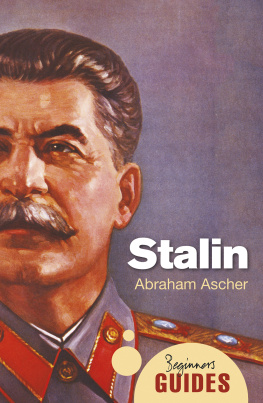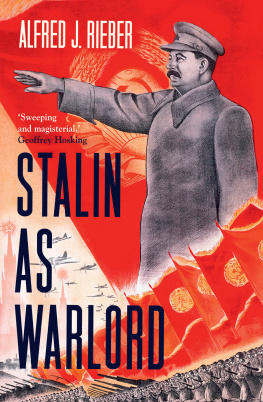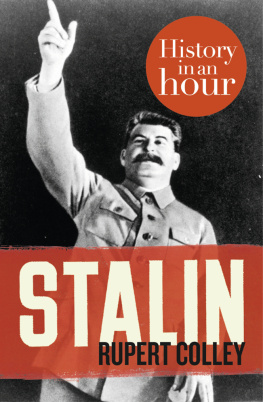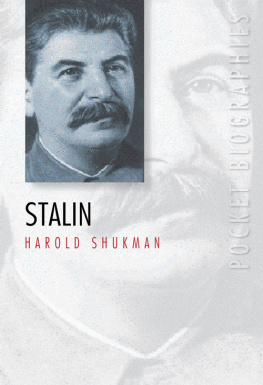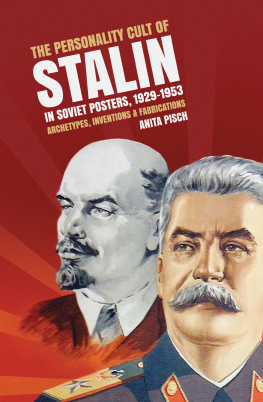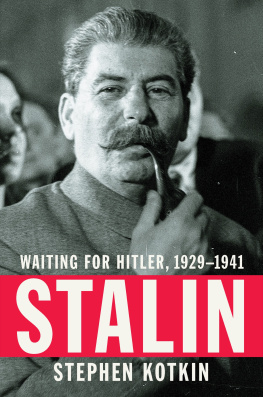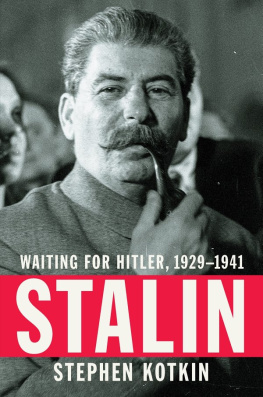
Joseph Stalin began life as a frail child, with an abusive father and an inferiority complex. This triggered an early desire for greatness and respect that would eventually turn the young Bolshevik idealist into one of the most ruthless dictators in modern history.
Like his contemporary, Adolf Hitler, Stalin was responsible for millions of deaths and inflicted barbaric cruelty on the Soviet people. But while Hitler is readily portrayed as a monster, Stalin has not been subjected to quite the same level of vitriol. In Stalin: A Beginners Guide , renowned historian Abraham Ascher analyses new and old sources, separating truths from falsehoods to present an unvarnished portrait of the Soviet leader.


For Anna
Contents
Joseph Stalin and Adolf Hitler are widely regarded as two of the most ruthless dictators of the twentieth century. But unlike Hitler, who has been almost universally depicted by professional historians as a fanatic and mass murderer, Stalin has been spared such widespread condemnation and has even been viewed favorably by some distinguished scholars in the West and by a fair number in Russia. For example, shortly after Stalins death on 5 March 1953, E. H. Carr, author of numerous acclaimed works on the Soviet Union, ended an evaluation of the Soviet ruler by lauding him as a great westernizer for having modernized Russias economy and for having turned the country into one of the two great world powers. In offering this appraisal of the man, Carr did not even mention the system of domestic terror enacted under Stalins auspices.
More recently, Eric Hobsbawm, an avowed Marxist considered by many to have been the United Kingdoms greatest historian in the twentieth century, defended Stalins economic policies even though they exacted a heavy price, the death of millions of innocent citizens. On 24 October 1994, the Times Literary Supplement reported in an interview with the historian conducted by Michael Ignatieff, himself a prominent scholar, that after failing to obtain a clear-cut answer from Hobsbawm on how he could justify his long-standing membership of the Communist Party, Ignatieff summed up the historians comments as follows: What that comes down to is saying that had the radiant tomorrow actually been created, the loss of fifteen, twenty million people might have been justified. Hobsbawm immediately, quickly, horribly, said Yes.
The failure of historians to treat the two dictators with the same degree of disdain can be attributed in good measure to the different political commitments of Nazi and communist leaders. The Nazis adopted racism as a central doctrine of their program and scoffed at the idea of treating all human beings with respect. By contrast, Soviet leaders were idealists as young men; they committed themselves to the abolition of the autocratic tsarist regime and the overthrow of capitalism, which they wished to replace with a system of rule based on the principles of egalitarianism and respect for the dignity of citizens of the Russian Empire.
Followers of Karl Marx and key proponents of his socialist philosophy, they insisted that Russia was ripe for a proletarian or working-class revolution even though the country had not yet undergone a bourgeois revolution and its economy had not yet fully evolved into an industrial, capitalist system. The Russian Marxists believed that the oppressed masses not only could overturn the tsarist autocracy but also could place power in the hands of the industrial working class in short, that Russia could bypass the capitalist stage of development and move immediately from monarchical rule and a predominantly agrarian society to a social and political order controlled by representatives of the working class. Marx himself once suggested that such a course of development might be possible, but generally he rejected the likelihood of its taking place in Russia. And virtually all his disciples in the West insisted that socialism could be reached only after capitalism had matured. In any case, no sooner had the revolution against the old order succeeded in Russia than the new leaders created a political system that in some important respects was more autocratic and more brutal in the treatment of the Russian people than that of the Tsars. They contended that the final goal of benign socialism as envisioned by Marx could only be reached when the more industrialized countries in the West underwent a revolution staged by the working class.
Stalin was part of the leadership of the proletarian revolution in Russia, although he was not one of the charismatic or intellectually most sophisticated men at the helm of the Bolshevik party, eventually to be known as the Communist Party, which engineered the seizure of power in November 1917. Yet within eleven years, in 1928, he succeeded in taking over the leadership of the party and in assuming dictatorial power in the Soviet Union, short for Union of Soviet Socialist Republics (or USSR), as the Russian Empire was now called. Stalins rise to power is a remarkable story indicating the ability of a clever and ruthless intriguer to outsmart rivals generally considered to have a more thorough grasp of Marxism.
A biography of Stalin, then, must grapple with several fundamental questions: how did Stalin, a person committed to the ideal of economic and social equality in a prosperous society, come to embrace an order that drifted far from these ideals? How did a man of Stalins talents manage to turn the Soviet Union into one of the most influential world powers? Perhaps most puzzling of all, why is there still a substantial residue of goodwill, more in Russia than in the rest of the world, toward a leader who caused so much pain to his own people and who never came close to achieving the idealistic goals he cherished when he became a revolutionary as a young man?
There is yet another difficulty that a biographer of Stalin must confront: the unreliability of so much that has been written by and about the man who ruled the Soviet Union for twenty-four years. Early in his career, Stalin himself acknowledged in a cynical comment that the written word could not always be trusted. In what is generally regarded as his most original contribution to Marxist thought, his essay on the nationality question published in 1913, he wrote the following in denouncing another socialist who had called G. V. Plekhanov, the founder of Russian Marxism, a demagogue: Paper will put up with anything that is written on it. This was one of Stalins cleverest comments, and it should serve as a warning to all who venture to write on any aspect of the history of the Soviet Union during the years of his rule.
STALINS PSEUDONYMS
To enhance his image and, once he became a revolutionary, to evade the police, Stalin adopted so many different names several dozen according to the historian Stephen Kotkin that readers of his biography may be forgiven if they succumb to confusion. He was christened in 1879 as Joseph Djugashvili, but even as a youngster he called himself Koba, the hero of the Georgian novel The Patricide by Alexander Kazbegi. In that novel Koba is depicted as a man of few words who excelled at climbing high mountains and who defied all authority. Joseph continued to favor this name during his early years as a revolutionary, but after several meetings in 1906 and 1907 with Lenin, a man he greatly admired for his toughness, he began, apparently in 1910, to use the name Stalin, which is best translated as man of steel, precisely the image he wanted to convey to his colleagues, the masses, and eventually to leaders of foreign countries. Occasionally, he still signed letters with K and sometimes with Koba Stalin. But during the Revolution of 1917 he tended to sign letters and documents with Peoples Commissar I. Stalin, a name that increasingly appealed to him because it sounded genuinely Russian, which was important to him. Unable to shed his Georgian accent, he at least had a name that seemed appropriate for a leader of a country that became ever more mindful of its national that is, Russian heritage. And after he rose to the position of absolute ruler, Stalin gave him an additional image he cherished, a person unshakable in his convictions and dedicated to turning the Soviet Union into a great power.

